#the tumblr gif search is hopelessly broken but i wanted y’all’s beautiful work in this post anyway
Explore tagged Tumblr posts
Text
I Feel You Linger in the Air: Novel vs Drama
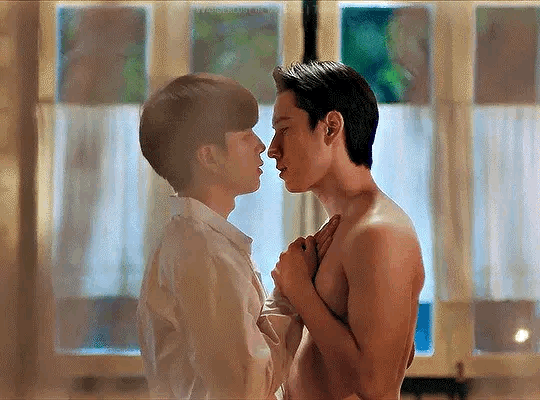
gif by @wanderlust-in-my-soul
Happy IFYL special day! While I wait (not so) patiently for the special episode to become available for international viewers, I thought I would stop being lazy and get around to writing up my thoughts on the adaptation choices of the drama now that I’ve finally had a chance to read the original novel.
First, let me just say: the novel is so fun. I’m so glad folks like @clairedaring and @pharawee talked about it on here and @waitmyturtles read it first and told me to jump on it, because I’ve had a really hard time with poorly translated y novels before and was definitely skeptical. But the story was excellent and the English translation was really solid, so a great time was had by all and I wasn’t even salty about spending eighteen American dollars on it. I didn’t think the novel was perfect (turtles can attest I had a few LOUD complaints) but it was a very enjoyable read. Shoutout to @bengiyo, @neuroticbookworm, and @wen-kexing-apologist as well for listening to me rant about Tee’s choices as I made my way through the novel. Bonus: if you have the chance to read this novel while vacationing in Thailand surrounded by plumeria trees and romantic scenery, I highly recommend.
So, with that established, let’s talk about the adaptation! Adapting novels to a visual medium always comes with a lot of choices, and it’s not easy to make everything translate effectively. On the other hand, a live action drama can make some of what’s on the page feel even more vivid and new elements can be introduced that add to the canon. I’m on the record as both loving this show and feeling like there were some significant missteps in the writing, so I really wanted to understand the source material and how some of those choices were made. So here’s your spoiler alert for IFYL’s adaptation: it’s a real mixed bag of choices from our dear frenemy Tee Bundit, and all in service of one clear goal.
I Feel You Linger in the Air, but Make It Sadder!
I’m going to break down the details below, but this is the TL; DR right here. Every choice Tee made in this adaptation was in service of transforming a relatively light and often comedic time travel romp into a story of deep melancholy and a thorough examination of queer pain. This is Tee’s whole schtick, so we can hardly be surprised; and yet I was kind of taken aback by how stark the difference in these stories felt even as a lot of the plot stayed the same. During the drama’s airing @respectthepetty talked about how this show was just too damn sad for her, and I gotta say, she was definitely picking up what Tee was putting down. YMMV on how sad you like your romance, but Tee Bundit is a very sad boy indeed.
Jom
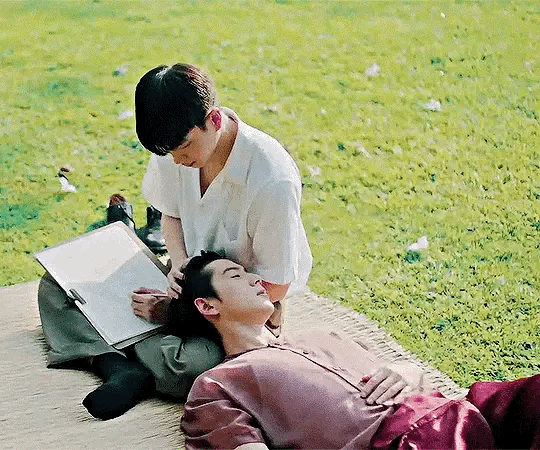
gif by @junghaesin
Let’s start here, because this is definitely my biggest grievance with Tee: he removed most of Jom’s personality from the book in order to give us a flatter, sadder version of him that fit better with a much more melancholy vision for this story. As it turns out, Jom was originally written to be smart, sassy, and very funny (h/t to @stuffnonsenseandotherthings whose post on this really got me interested in reading to see the difference). Novel Jom is a smartass who never misses the opportunity to work in a salty comment or express his frustration when things aren’t going his way, and he’s such an active character. He does not just sit back and let things happen to him; he thinks and he struggles and he tries. By comparison, show Jom just feels… vaguely confused, mildly depressed, and wildly passive most of the time. This is by no means a knock on Nonkul, who is a fantastic performer—these are clearly writing and directing choices and he is interpreting the character as instructed.
And it’s not just the removal of his core personality, either. Jom in the book has emotional intelligence and a stronger sense of connection to others. For one, he actually cares that Eung Phueng is his sister! Throughout the book, we see him dedicate time and energy to finding ways to care for his sister despite their different social stations; this dynamic is completely absent from the show, where Jom doesn’t even seem to remember Eung Phueng has his sister’s face most of the time. This was a major hole in the show and I still don’t really understand why Tee dropped the ball on it when there was so much material to drawn from in the book.
Winner: The novel, hands down. If you take nothing else away from this post, please take it as a recommendation to read the novel so you can experience Real Jom in all his sassy glory.
The Mythology
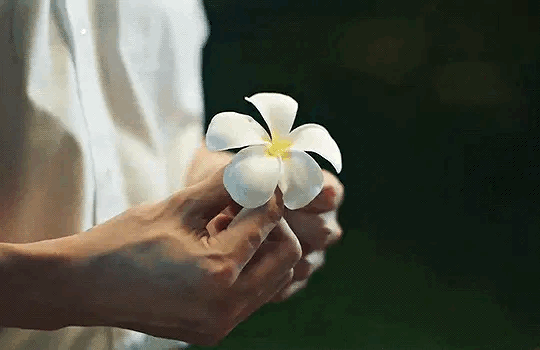
gif by @chickenstrangers
Now, I can’t really claim that either the novel or the show does a fantastic job with the mythology, because there’s a lot of hand waving in either case and some definite plot holes. But I will give the book credit for being upfront from the start: it didn’t really intend to explain it beyond giving us a little preamble about wormholes (yes, wormholes!) and for having Jom actually notice and care (and get very amusingly frustrated) that he didn’t understand what the wormhole wanted him to do or how to control it. He actually tried quite a lot in the book to figure it out, rather than just sitting around gazing morosely into the distance. In the end, the book tells us that Yai vowed to love Jom at first sight in every lifetime, which is a vow he made after the wormhole brought Jom to him but somehow affects the times that had already happened from our perspective. It’s a paradox that doesn’t fully make sense, but it is at least an explanation.
The show, by contrast, intentionally added layers to this mystery that it had no intention of resolving. The drawings opening up connections to the present, the ghostly visages haunting the characters, the glimpses of Jom in the future doing things we never saw in the original timeline, Mustache Yai kissing Jom in the water—all show inventions, and all setting up an expectation that some sense would be made of these clues. Which of course, never happened. Instead, these things were used to contribute to the spooky scary vibe and make everything feel sadder, and the show offered no explanation at all for why any of this happened.
Winner: It’s a draw since neither really did it well, but I’m staying salty with Tee for fucking with me.
Family Drama

gif by @thii-nii
Here is where we get into some of the stuff Tee added to the story that actually worked pretty well. One very smart adaptation choice: he made Yai and Eung Phueng siblings so that Yai would have a reason to be more involved in their household and able to interact much more with Jom in the early parts of the story; in the novel there is no connection between the households and Yai and Jom barely interact for the first several months after Jom arrives in the past. He also added a lot of family drama in the back half of the show: the struggles with Yai’s father, the shady uncle, the plot to force Yai to marry, and the big confrontation over Robert’s misdeeds are all show inventions, likely added both to pad out the story and make the relationship harder and sadder, and because he was looking for an alternate source of conflict since he was not doing Part 2 of the book (which takes place once Jom is yanked away again and shot back to the Commander Yai time period).
Another major change from the novel to the show: in the novel, Yai’s plans to go study abroad were already set before Jom even got there, not something he won as a consolation in a negotiation over marriage. Which has some implications I’ll get into in the next section.
Winner: The drama, where the family dynamics were much more thoroughly explored.
The Romance
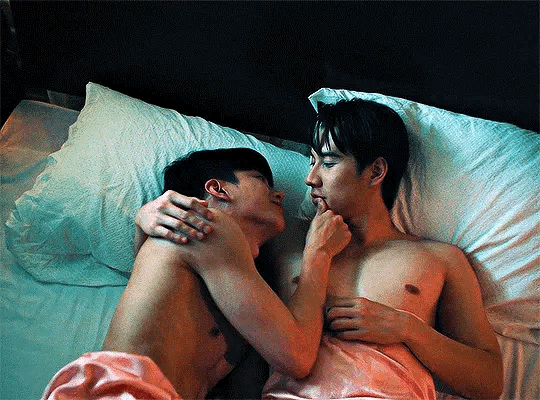
gif by @loveisactivated
As I mentioned above, Tee made a smart choice in bringing Yai more firmly into Jom’s orbit early in the story, but unfortunately, he didn’t do much with that advantage and actually failed to use some of what the novel gave him to work with. In the novel, Jom is much more aware of the attraction between him and Yai, very attuned to Yai’s flirting and their age gap, very aware of his own growing attachment to Yai, and thinking through the implications of all of it as it grows, which is a more natural and believable build up to their romance than in the show, where Jom seems distracted and unaware of Yai’s affections until they suddenly start jumping each other. That lack of romantic development in the show (which we discussed even as it was airing) was not because the material was not there for Tee to use in the book; he simply had other priorities and neglected to build it properly in show time.
That said, I have to give major credit to Tee for how he handled the romance once our leads were together and intimately involved. First, he really brought some of the scenes that were in the book to life in a way that still has me shook, like Yai’s drunken poetry recitation (credit must also be given to Bright for his eye work in that and many other scenes, what a stunner). And on top of that, the drama has some of the best physical intimacy scenes I have ever seen in any drama, full stop, and that is nearly all Tee and his creative team. He used elements from a few scenes in the book, but he remixed and amplified them to be a lot more powerful, and certainly much more artful and sensual than the sex scenes in the book. That olive oil masturbation scene? The show gets full credit, and the way the direction, editing, and performances so vividly painted their attraction to each other still gives me shivers when I think about it.
But anyway, back to bitching about Tee: one of the scenes that really stuck out for me like a sore thumb in the romance arc in the show was when Yai learns he will be going abroad and he and Jom discuss it in a curiously flat and emotionless way, with Yai acting like it’s no big deal for them to be separated for three years. I mentioned above that this was a change from the book: in the novel Yai was already set to go abroad before he ever met Jom, it was not a new surprise that came about after they were together. They discuss Yai’s impending departure twice in the book; once when Jom is still only Yai’s majordomo, and then once again when they are lovers. As you can imagine, the emotional tenor of these two scenes are quite different. And Tee used the wrong one for the show! I almost threw the book at the wall when I realized I was reading the verbatim dialogue from that scene in the show in the context of Yai and Jom hardly knowing each other yet, and then again when I got to the second conversation that was actually appropriate for two lovers who do not want to be parted. That has to be one of the most senseless adaptation mistakes I have ever seen. Tee Bundit, what is wrong with you!!
Lastly for this section, I will just note that the very long, drawn out goodbyes between Yai and Jom are also a show invention. In the book, Jom gets yanked to the next time period with no warning shortly after they get together and begins his next adventure with another Yai. Since Tee was ending the show here in this time period, he went in a different direction, having Jom and Yai much more aware of Jom fading and anticipating a separation so that he could (say it with me) make everything sadder. His choice to wallow for two entire episodes in sorrow and melancholy and to put much heavier focus on Yai’s despair was entirely his own, and so very on brand.
Winner: It’s a draw. The book definitely writes the romantic arc more holistically and doesn’t have any of the missteps the drama does, but the show is so artful and the parts it gets right are so good I will remember them for the rest of my life. And I can’t pretend I’m not an angst monster at heart, so Tee’s sad af vision totally worked on me.
Sides and Queer Community

gif by @my-rose-tinted-glasses
Here is where Tee’s adaptation really shines, and I know others have discussed these changes before so I won’t go too deep on the details. But I absolutely have to give Tee props for taking tiny threads for these side characters in the books and building them into whole people that we actually care about. Especially in the case of Ming and Fong Kaew, Tee really made something of their extremely thin book stories to turn them into fan favorite characters with real growth arcs. I do think the book was better in the way it handled the fated connection between Fong Kaew and Khamsaen, but everything else about Fong Kaew’s story was deepened by the show. And Tee gets credit for adding so many meaningful stories for women characters in the first place, let alone developing a lesbian romance for Eung Pueng and Maey. He picked up on a tiny bit of subtext for underdeveloped characters in the book and ran with it, and it really enhanced the story.
He also used side characters as a means to make this story feel all around more queer, not only by including additional queer romances but by building out a real sense of community and solidarity among the queer characters. Not only the addition of nods to real queer history, but the speakeasy, James’s explicit queerness, and Nuey the Green Queen are all Tee additions to the canon that really enhanced the story.
Winner: The drama and it’s not close. Well done, Tee!
That Ending

gif by @dragonsareawesome123
One of my biggest interests in reading the novel was seeing how the ending with modern Yai is explained in the original source material, because I found the drama version of that scene so lacking. Well, it turns out, the novel did pretty much the same thing! The ending sequence of the book is even shorter than the scene in the show and similarly offers zero explanation for this new version of Yai or how he knows Jom before they jump each other and the story concludes. The main narrative ends there and the book then tacks on an epilogue explaining who this new Yai is, and it reads like an afterthought. Honestly, it felt to me like the writer ran out of steam and just didn’t bother to finish the story, and Tee did exactly the same thing. Which is kind of infuriating, because being able to fix stuff like that is one of the best things about a good adaptation.
Winner: Absolutely no one, my kingdom for a proper ending to this story.
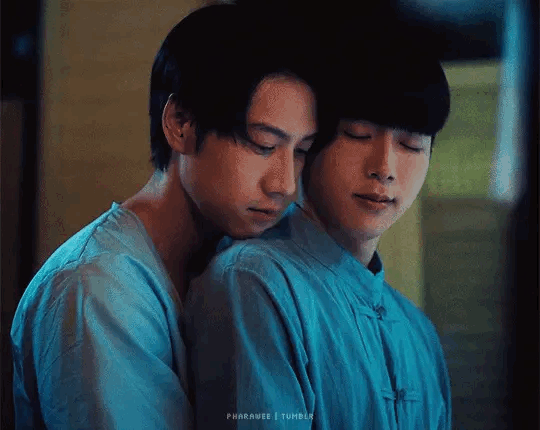
gif by @pharawee
So, my conclusions? 1) Tee Bundit is the saddest creator in Thai bl, hands down; 2) It’s a draw between which version of this story is better. The novel and drama both have different strengths and significant flaws, but both versions are compelling and had me on the edge of my seat. I highly recommend the book to anyone who is missing the show and wants another chance to revisit these characters, plus the added bonus of seeing Jom wrangle Commander Yai, something we are unlikely to ever see on our screens (though hope springs eternal besties!). If you do decide to give it a read, come talk to me about it!
#i feel you linger in the air#ifylita#shoutout also to all the excellent giffers for this show#the tumblr gif search is hopelessly broken but i wanted y’all’s beautiful work in this post anyway#thai bl#shan shouts into the void
102 notes
·
View notes